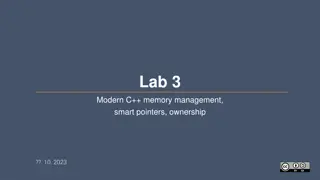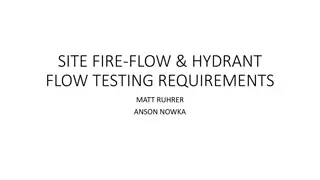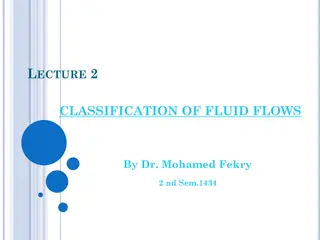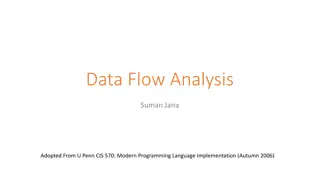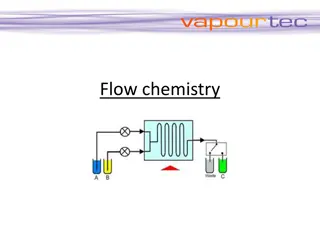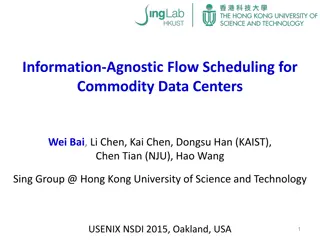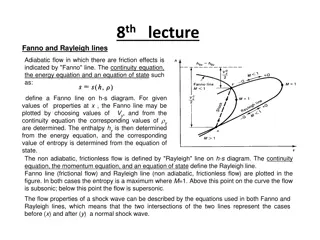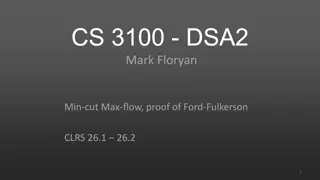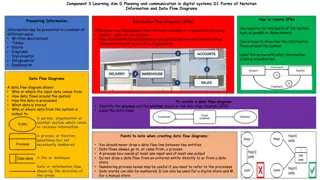Implementing a Dynamic Information Flow System with Valgrind
An in-depth guide on implementing a Dynamic Information Flow System (IFS) using Valgrind, a virtual machine that incorporates just-in-time compilation and dynamic recompilation. Explore IFS, its importance in confidentiality and taint analysis, memory reference error detection, data lineage, and more. Learn about Valgrind infrastructure tools, creating new tools in Valgrind, storing abstract state using shadow memory, and utilizing Valgrind APIs for shadow registers.
Download Presentation

Please find below an Image/Link to download the presentation.
The content on the website is provided AS IS for your information and personal use only. It may not be sold, licensed, or shared on other websites without obtaining consent from the author. Download presentation by click this link. If you encounter any issues during the download, it is possible that the publisher has removed the file from their server.
E N D
Presentation Transcript
Implement A Dynamic Information Flow System in Valgrind
Information Flow System Dynamic Instrumentation Difference from hooking What is IFS A dynamic system that tracks the propagation of information. E.g. a value is secret, what are the set of values in other places that are also secret. IFS is important Confidentiality at runtime = IFS Taint analysis = IFS Memory reference errors detection = IFS Data lineage system = IFS Data dependence detection in dynamic slicing = IFS An IFS implemented on Valgrind.
Language and Abstract Model Valgrind is in essence a virtual machine that uses: just-in-time (JIT) compilation dynamic recompilation Intermediate Representation (VEX IR) RISC Based Abstract state One bit/byte, the security bit (taint bit). For each variable (each memory location), we maintain one bit information. Prevent call at tainted value.
Valgrind Infrastructure Tool 1 VALGRIND CORE BB Decoder Tool 2 Binary Code BB Compiler Dispatcher Tool n Instrumenter Trampoline Input Runtime OUTPUT:
Implement A New Tool In Valgrind Use a template The tool lackey is a good candidate Two parts to fill in Instrumenter Runtime Tool n Instrumenter Instrumenter Initialization Instrumentation Finalization System calls interception Runtime Runtime Transfer functions Memory management for abstract state
How to Store Abstract State Shadow memory Three types of shadow memory (for mapping) Mem. Addr Abstract State Registers Abstract State Temp Abstract State Registers can be handled by Valgrind utilities Virtual Space Shadow Space [addr] val abs table = (Bool**)VG_(malloc)("Memory shadow", 0xFFFF * sizeof(Bool*)); tempshadow = (Bool*)VG_(malloc)("Temp shadow" , 0xFFFF * sizeof(Bool)); //64K limits for temp vars
How to Store Abstract State Valgrind provides API for shadow registers. VG (get shadow regs area) table = (Bool**)VG_(malloc)("Memory shadow", 0xFFFF * sizeof(Bool*)); tempshadow = (Bool*)VG_(malloc)("Temp shadow" , 0xFFFF * sizeof(Bool)); for(i=0; i<0xFFFF; i++){ //initialization table[i] = NULL; tempshadow[i] = False; }
Acccessing Shadow Memory static Bool get_shadow_mem(Addr addr){ Int up = (((addr)&(0xFFFF0000)) >> 16); Bool* lookup = table[up]; if(lookup == NULL) return False; else{ Int low = (addr)&(0x0000FFFF); return lookup[low]; } } staticvoidset_shadow_mem(Addr addr, Bool value){ //VG_(printf)("set_shadow_mem %x %d \n" , addr, value); Int up = (((addr)&(0xFFFF0000)) >> 16); //first level of indirection Bool* lookup = table[up]; if(lookup == NULL){ //on-demand allocation! table[up] = (Bool*)VG_(malloc)("Memory shadow", 0xFFFF * sizeof(Bool)); } else{ Int low = (addr)&(0x0000FFFF); lookup[low] = value; } }
Accessing Shadow Memory for Temp static Bool get_shadow_temp(IRTemp temp){ return (temp==-1)?False:tempshadow[temp]; } static void set_shadow_temp(IRTemp temp, Bool value){ tempshadow[temp] = value; }
Initialization VG_DETERMINE_INTERFACE_VERSION(ta_pre_clo_init) staticvoidta_pre_clo_init(void) { VG_(details_name) ("Taint analysis"); VG_(details_version) (NULL); VG_(details_description) ("the minimal Valgrind tool"); ... VG_(details_bug_reports_to) (VG_BUGS_TO); VG_(basic_tool_funcs) (ta_post_clo_init, ta_instrument, ta_fini); VG_(needs_syscall_wrapper)(ta_pre_call, ta_post_call); //Abstract memory definition and initialization }
Finalization static void ta_fini(Int exitcode) { //Reporting Statistics/collected information if needed //Clean up allocated memory }
Instrumentation & Runtime static IRSB* ta_instrument ( VgCallbackClosure* closure, IRSB* sbIn, ) { IRSB* sbOut = deepCopyIRSBExceptStmts(sbIn); for (i = 0; i < sbIn->stmts_used; i++) { IRStmt* st = sbIn->stmts[i]; if(!st) continue; switch (st->tag) { case Ist_Put: case Ist_Store: case Ist_PutI: case Ist_WrTmp: default: addStmtToIRSB(sbOut, st); return sbOut; } * Please consult the following header file for details of the valgrind VEX instructions: <Valgrind>/VEX/pub/libvex_ir.h
Ist_IMark case Ist_IMark: //Specifies the beginning of a machine instruction // Start tracing in main //VG_(printf)("Ist_IMark\n"); if (VG_(get_fnname_if_entry)(st->Ist.IMark.addr, fnname, sizeof(fnname))) { if(VG_(strcmp)(fnname, "main") == 0) { trace = True; } elseif(VG_(strcmp)(fnname, "exit") == 0) { trace = False; } }
Instrumentation & Runtime - Ist_Put case Ist_Put: //puts value of temporary variable or constant into the register. //Write into a guest register, at a fixed offset in the guest state. if(trace) { //to start tainting from main() offset = st->Ist.Put.offset; // Look at: <Valgrind>/VEX/pub/libvex_ir.h data = st->Ist.Put.data; //VG_(printf)("Ist_Put offset %d data %d\n", offset, data); (HWord) (data->tag == Iex_RdTmp)?(data->Iex.RdTmp.tmp):-1)); argv = mkIRExprVec_2( mkIRExpr_HWord((HWord)offset), mkIRExpr_HWord( VG_(fnptr_to_fnentry)(ta_put),argv ); //constructing dirty helper calls dirty = unsafeIRDirty_0_N( 2, "ta_put", addStmtToIRSB( sbOut, IRStmt_Dirty(dirty) ); } addStmtToIRSB( sbOut, st ); break; static VG_REGPARM(2) void ta_put(Int offset, Int tmp) { //VG_(printf)("ta_put %d %d\n", offset, tmp); ThreadId tid = VG_(get_running_tid)(); Bool shadow_reg = get_shadow_temp(tmp); //If tmp is tainted then propagate VG_(set_shadow_regs_area) ( tid, 1, offset, 1, &shadow_reg); }
case Ist_WrTmp: //Assign a value to a temporary. tmp = st->Ist.WrTmp.tmp; data = st->Ist.WrTmp.data; //VG_(printf)("Ist_WrTmp tmp %d datw %x\n", tmp, data); switch(data->tag) { >Iex.RdTmp.tmp)); VG_(fnptr_to_fnentry)(ta_wrtmp_rdtmp), argv ); addStmtToIRSB( sbOut, IRStmt_Dirty(dirty) ); break; case Iex_Const: ... case Iex_Load: ... case Iex_Get: ... case Iex_Binop: arg1 = data->Iex.Binop.arg1; arg2 = data->Iex.Binop.arg2; argv = mkIRExprVec_3( ...); dirty = unsafeIRDirty_0_N( ..., "ta_wrtmp_binop", ... ); addStmtToIRSB( sbOut, IRStmt_Dirty(dirty) ); break; case Iex_Triop: ... case Iex_RdTmp: argv = mkIRExprVec_2( mkIRExpr_HWord((HWord)tmp), mkIRExpr_HWord( (HWord)data- dirty = unsafeIRDirty_0_N( 2, "ta_wrtmp_rdtmp", }
Instrumentation & Runtime SYS CALLs VG_(needs_syscall_wrapper)(ta_pre_call, ta_post_call); //to be notified staticvoid ta_post_call(ThreadId id, UInt syscallno, UWord* args, UInt nargs){ if(trace){ if(syscallno == __NR_read){ // Read system call VG_(printf)("read %x %d\r\n", args[1], args[2]); Int i; for(i=0; i< args[2]; i++){ set_shadow_mem(args[1]+i, True); } } } }
Instrumentation & Runtime - CALL static VG_REGPARM(3) void RT_Exit(OpAddr* guard1, HWord guard2, Addr dst) { // do not need to check taint types since taint bits // subset taint type if (get_shadow_mem(dst)) { VG_(printf)("Call address tainted.\n"); VG_(exit)(1); }
Done! Let us run it through a buffer overflow exploit void (* F) (); char A[2]; ... read(B, 256); i=2; A[i]=B[i]; ... (*F) ();
Virtual Space Shadow Space void (* F) (); char A[2]; ... read(B, 256); ... MOV &B, r1 MOV 256, r2 SYS_Read r1, r2 ... MOV 2, r1 ST r1, [&i] ... LD [&i], r1 MOV &B, r2 ADD r1, r2 LD [r2], r2 MOV &A, r3 ADD r1, r3 ST r2, [r3] ... MOV F, r1 CALL r1 i F ... A[1] A[0] i=2; ... 1 1 1 A[i]=B[i]; ... B r1 r2 r3 (*F) ();
Virtual Space Shadow Space void (* F) (); char A[2]; ... read(B, 256); ... MOV &B, r1 MOV 256, r2 SYS_Read r1, r2 ... MOV 2, r1 ST r1, [&i] ... LD [&i], r1 MOV &B, r2 ADD r1, r2 LD [r2], r2 MOV &A, r3 ADD r1, r3 ST r2, [r3] ... MOV F, r1 CALL r1 i F 1 ... A[1] A[0] i=2; ... 1 1 1 A[i]=B[i]; ... B r1 r2 r3 1 (*F) ();
Virtual Space Shadow Space void (* F) (); char A[2]; ... read(B, 256); ... MOV &B, r1 MOV 256, r2 SYS_Read r1, r2 ... MOV 2, r1 ST r1, [&i] ... LD [&i], r1 MOV &B, r2 ADD r1, r2 LD [r2], r2 MOV &A, r3 ADD r1, r3 ST r2, [r3] ... MOV F, r1 CALL r1 i F 1 ... A[1] A[0] i=2; ... 1 1 1 A[i]=B[i]; ... B r1 1 r2 r3 1 (*F) ();






